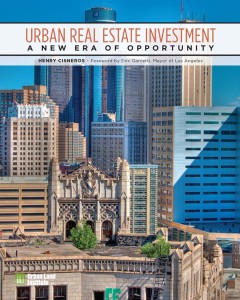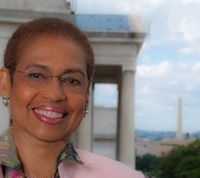Former HUD Secretary Henry Cisneros Identifies Investment Potential of Major U.S. Cities with Varied Economic Outlooks in ULI Book, Urban Real Estate Investment: A New Era of Opportunity
 WASHINGTON, D.C. – March 30, 2015 – (RealEstateRama) — In a new book published by the Urban Land Institute (ULI), former U.S. Housing and Urban Development (HUD) Secretary Henry Cisneros identifies potential for real estate investment in 45 metropolitan areas that exist on a spectrum of strong, weak, and mixed prospects for economic growth.
WASHINGTON, D.C. – March 30, 2015 – (RealEstateRama) — In a new book published by the Urban Land Institute (ULI), former U.S. Housing and Urban Development (HUD) Secretary Henry Cisneros identifies potential for real estate investment in 45 metropolitan areas that exist on a spectrum of strong, weak, and mixed prospects for economic growth.
In Urban Real Estate Investment: A New Era of Opportunity, Cisneros offers an innovative and nuanced analysis of major U.S. cities by merging pre-existing data sets: quantitative performance indicators measuring economic output and demographic trends and a qualitative, city-by-city ranking based on surveys and interviews with real estate developers and investors. Developed by an independent research firm, the quantitative indicators include each city’s unemployment rate; changes in population; and job, income, and GDP growth. The city-by-city ranking is based upon the “U.S. Markets to Watch” section of Emerging Trends in Real Estate 2014®, produced jointly by ULI and PwC. This ranking is based on survey responses and in-depth interviews with leading real estate professionals.
Cisneros examines cities that appear in both data sets and groups them into four broad categories: consensus strongest, mixed rankings with strong measures; mixed rankings with weak measures; and consensus weakest.
The strongest cities are those that have demonstrated robust economic and demographic growth through varied and vibrant economies that rely on advanced industries and technology-based innovation. These cities, including Austin, Denver, and Portland, are globally competitive and ranked high by real estate investment professionals. The two mixed categories include cities with strong performance indicators, such as significant neighborhood redevelopment, the presence of strong anchor institutions, or status as a state capital, but which also have a weak housing market or an overreliance on legacy industries such as heavy manufacturing. These cities, including Baltimore, Phoenix, and Los Angeles, receive a mixed prognosis for investment. The weakest cities are those that lack economic diversity and continue to suffer population loss, and include cities associated with legacy industries, including Detroit, St. Louis, and Providence, Rhode Island.
All four categories, including those with weak indicators, show potential and opportunity for real estate investment and urban renewal, according to Cisneros. He provides the example of Detroit, where investment opportunities exist in the form of inexpensive, available land and low rents that could serve as a magnet for technology entrepreneurs and creative industries. Detroit’s tradition of strong institutional leadership, and its ability to attract businesses like Quicken Loans to its downtown, suggest a turning point in the city’s recent history and points to enormous potential for investment, Cisneros notes. “Detroit today is the place that will most dramatically test the question of whether a great American city will be allowed to slide to oblivion,” he writes.
Additionally, Cisneros identifies and explores 13 trends that are positively impacting U.S. cities, including the importance of building for sustainability, harnessing the power of advanced industries and anchor institutions, adding transit-related value, and encouraging mixed-income housing positively.
Founder and Chairman of CityView, an institutional investment company focusing on urban real estate with offices in Los Angeles and San Antonio, Cisneros has authored or edited numerous articles, books, and speeches on cities, housing, and urban development during his 35-year career in public service. From 1981-1989, he was mayor of San Antonio, having been elected to four consecutive terms. In 1992, U.S. President Bill Clinton appointed Cisneros as secretary of HUD, a position he held for five years. From 1997-2000, Cisneros served as chief operating officer of Univision Communications, the nation’s largest Spanish-language media company. He formed American CityView, which later became CityView, in 2000. One of ULI’s leading members, Cisneros served on the advisory board for the ULI Terwilliger Center for Housing from 2007 through 2014.
Urban Real Estate Investment: A New Era of Opportunity (ISBN 978-0-87420-358-5) is available through ULI’s online bookstore for $59.95. (The Canadian price is $71.95) and ULI members receive a 25-percent discount; to order copies, go to bookstore.uli.org or call 1-800-888-4741.
NOTE TO EDITORS AND REPORTERS: Members of the media are invited to hear Secretary Cisneros speak on Urban Real Estate Investment: A New Era of Opportunity on Tuesday, March 31, at the Innovation and Entrepreneurship in Real Estate Awards Dinner 2015 at the University of Maryland, Riggs Alumni Center. The event begins at 6 pm. To obtain a complimentary copy of the publication and request an interview with the author, contact Robert Krueger at 202-624-7051.
About the Urban Land Institute
The Urban Land Institute (www.uli.org) is a nonprofit education and research institute supported by its members. Its mission is to provide leadership in the responsible use of land and in creating and sustaining thriving communities worldwide. Established in 1936, the Institute has more than 34,000 members worldwide representing all aspects of land use and development disciplines.
?ontact: Robert Krueger at 202-624-7051

















